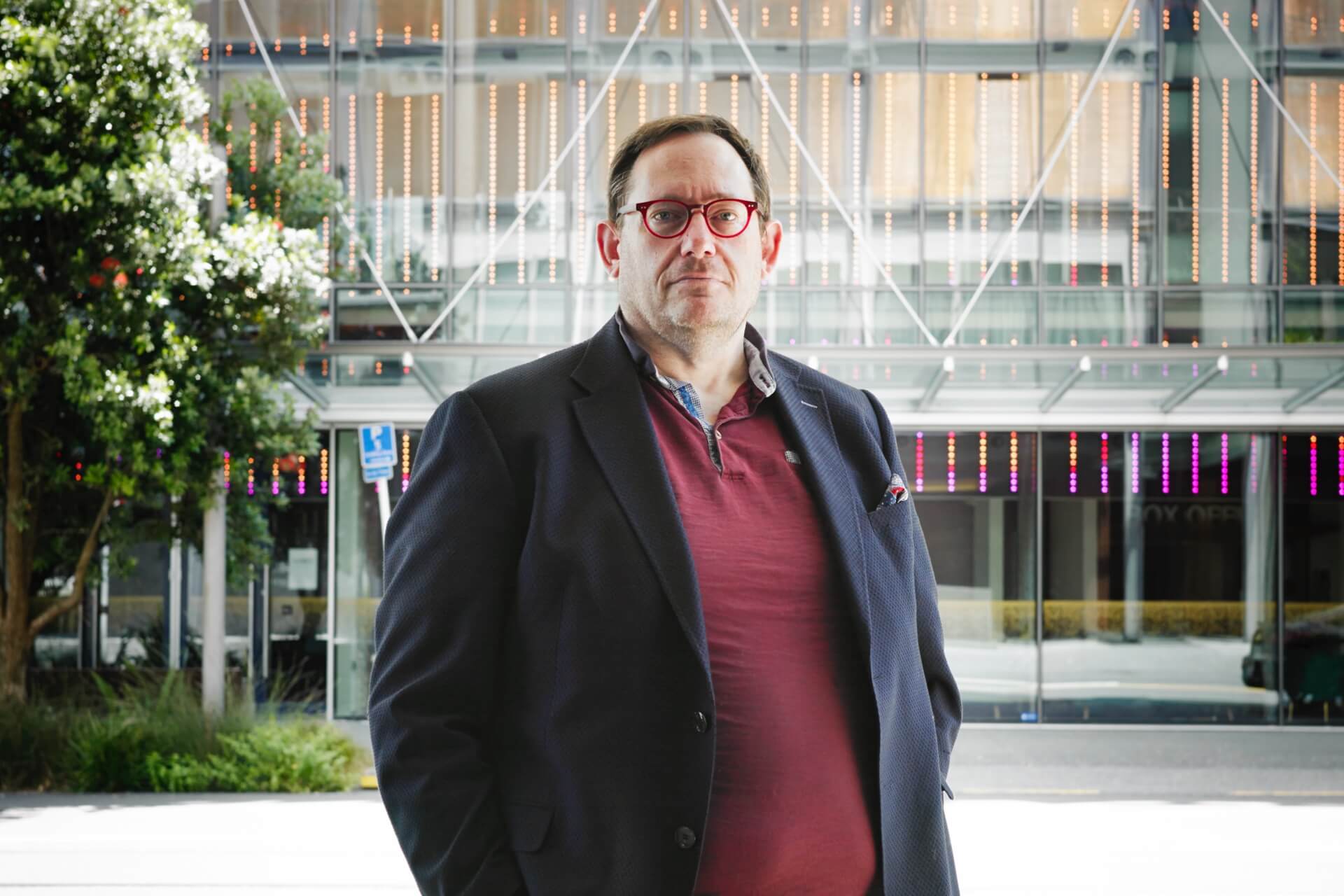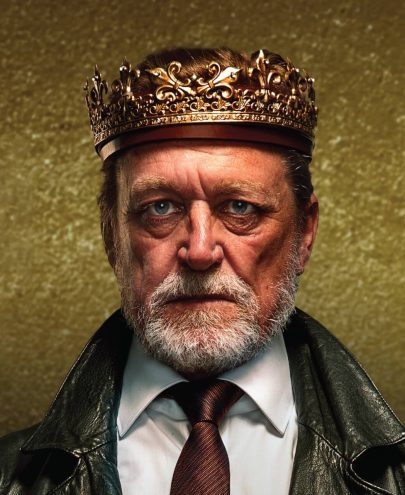Feb 14, 2022 Theatre
More than two months into the Delta lockdown, Auckland Theatre Company’s Jonathan Bielski is at home with the cats. At the kitchen counter, sitting in front of the room’s drawn, striped curtains, he recalls the exact moment that everything went to shit. “I was at our headquarters in Balmoral when I saw the thing pop up on my phone. And I just thought, ‘Oh. This is not good.’ It’s tragic, in those moments, because there aren’t really any decisions to make. They’ve all been made for you. You just have to go home.”
Bielski has been ATC’s chief executive officer since 2019, though he’s worked for the company since 2016. (In between, he was also the artistic director of the Auckland Arts Festival for a three-year stint.) In June this year, shortly before lockdown, Bielski assumed ATC’s new joint leadership role, becoming both its CEO and artistic director. It was his background, most notably as a self-described career arts administrator (“or an impresario, really”), that he believed would help to navigate the company through an upcoming nest of complicated operational, commercial and artistic complexities while they undergo a period of transition — which it very much is, in many ways. There’s the transition as they move from one artistic director to another; from its current structure to a more “deconstructed” model of working; and, of course, from a mostly Covid-free Aotearoa to one where the virus is controlled, but endemic.
Despite the obvious unpredictability of the virus, Bielski’s 2022 programme is back-to-back, a full no-holds-barred schedule that, rather than trying to foresee the various versions of traffic lights and restrictions, moves full steam ahead. To not do so, he says, would be “quite devastating for an awful lot of people”. By this, of course, he’s referring partly to the artists, producers and crew working on shows who witness weeks of rehearsals and mahi slowly emptying down the drain when an evolving Covid situation reveals itself to be inching closer to a lockdown.
There is a see-sawing tension in ATC’s 2022 programme, its eight shows a manifestation of the vision to cater to a broader, contemporary Tāmaki Makaurau. It’s essentially an acknowledgement of what ATC is — a particular kind of membership, subscription-based theatre company — and a hope that it becomes “a place where artists and audiences can look at, see themselves, and recognise their story and their experience”. It’s a line of thinking that Bielski has tried to bring to the table: there will be people who are interested in what is referred to as the “collection” (that is, ATC and its full season of work) and others who will come in and out, to attend the shows they feel a sense of affinity with, sometimes for the first time. “Both,” he says, “are necessary and valuable.”
For example, 2022 kicks off with Grand Horizons, a summer comedy directed by Jennifer Ward-Lealand that is characteristically ATC. Then later in the year, you can head along to watch Dawn Raids, directed by Oscar Kightley and a collaboration between the theatre company and Pacific Underground. Or, an Alfred Hitchcock adaptation, North by Northwest, or Nathan Joe’s form-challenging play, Scenes from a Yellow Peril, with SquareSums&Co and in association with Oriental Maidens. “I’m responding to the way in which artists are wanting to make work,” Bielski says. The collaborations with other cultural organisations can be described as “a warm embrace” between the two parties. The golden rule, he says, is that ATC doesn’t assert control. “I’m not going to be standing in the rehearsal room telling a bunch of brown artists how they should tell their story.” While he acknowledges this sort of working is not necessarily new to ATC, “there’s a fidelity to the idea that I’m bringing”.
On a broader scale, Bielski sees this programme as one informed by Covid, though definitely not a “Covid programme”, whatever that is. Most shows lean into the idea of human connection; of family in the more encompassing sense of the word. “One of the things that has been most challenged during Covid is the idea that physical touch has become problematic. Connections have been challenged and kept apart. I think art, and theatre in particular, is well suited to exploring the nature of human bonds, and when they’re under pressure.”
The transitional vision of ATC, which has an intention of reflecting a truer depiction of the many Aucklands that exist on top of each other, cannot be executed by simply inviting in playwrights from other cultures. “It’s much more about working differently. And that’s invited the necessary process of institutional reform.” The company, he says, “needs to reform itself to be something that is able to respond to a contemporary Auckland”. Part of that is exploring the possibilities of changing the autocratic curatorial decision-making process and looking at moving to a more shared decision-making model. “There’s also that underlying tension of, what does a bicultural company look like?” Bielski says. “We’ve had work made by, for and from a Māori point of view, but the company itself hasn’t addressed the question of biculturalism.”
Bielski is undeniably aware of the power of his position, and although feeling “uncomfortable” with it isn’t quite accurate, it’s clear there have been significant efforts to, as he puts it, “de-emphasise” his role as a cultural gatekeeper. Lockdown has provided nothing but time, and words, of both confidence and of doubt, have tumbled from him easily throughout the conversation as if he’s said them hundreds of times before — and maybe he has.
“We’re about to start a recruitment process to engage some artistic associates who will form a leadership of the company with me. By its very nature, the purpose of doing that is there will be contrasting world, cultural, political views to my own; not to hire a fan club, but to hire others who can sit at the table and make decisions with me now.” But then, he admits, “there’s still somebody with the title of CEO. So what does that actually mean? That you make decisions together? I don’t have a very clever answer to that yet. But I know what’s in my heart, and what I intend.”
These problems — of trying to have equality and equity within decision-making structures, of power imbalances when there’s someone who very clearly is sitting on top — are not unique, but Bielski is hoping that once the right people come on board, a co-designing process of how it could work will emerge.
When asked about how he sees things unfolding at ATC as we move into an era of “living with the virus”, Bielski is hopeful that vaccination passes (and requiring them for all staff and attendees) will allow shows to go ahead at full capacity. His real concern is what happens when someone involved with a show, whether on stage or in the audience, tests positive for Covid. “Artists are no more immune to the anxieties of working in a Covid-endemic world. And in particular, actors, because the nature of their work is so intimate. Unlike with film, which can use camera tricks to make people look like they’re closer to each other, in theatre, it’s impossible.”
To address the wider industry, too, Bielski observes that the lack of formal government support for artists has been well documented throughout the pandemic, with many concerned that independent artists and smaller, project-based companies will fall through the cracks. While ATC have been able to pay their artists, that hasn’t been the case for everyone. “There has been some really strong advocacy, particularly from Cat Ruka [director of the Basement Theatre], but movement has been so slow. There’s been some interesting thinking coming out around highlighting what has become known in recent times as the Irish Question: should we have some kind of universal wage for artists?”
The other common topic of conversation has been around possible insurance schemes. “Because what tends to happen is that when there’s a cancellation or a disruption, artists are often seen as the line in the budget that can be varied. You know, the power bill is the power bill.”
In November, the Government announced the Events Transition Support Payment Scheme, which will cover 90% of the costs of large-scale events if they’re cancelled or postponed because of Covid this summer. The kicker: attendees must number 5000 or more.
Though it’s likely to be a bumpy ride, Bielski is ultimately positive theatre can and will exist in its full capacity in 2022. “It seems weird to launch a programme in a moment like this… but I still remain quite optimistic. Yeah, I’m an optimist about what’s going to happen.”
Auckland Theatre Company’s first play in 2022, Grand Horizons,
begins on 8 February at the ASB Waterfront Theatre.
The next scheduled play, Lysander’s Aunty has been cancelled due to the ongoing pandemic
–
This story was published in Metro 433.
Available here in print and pdf.






